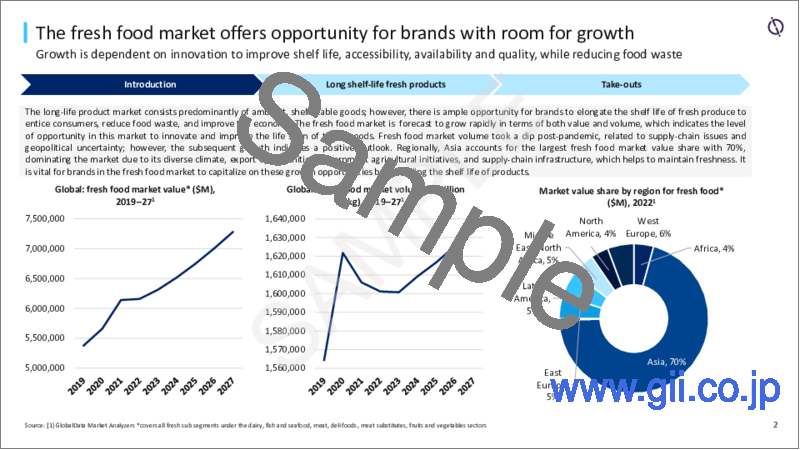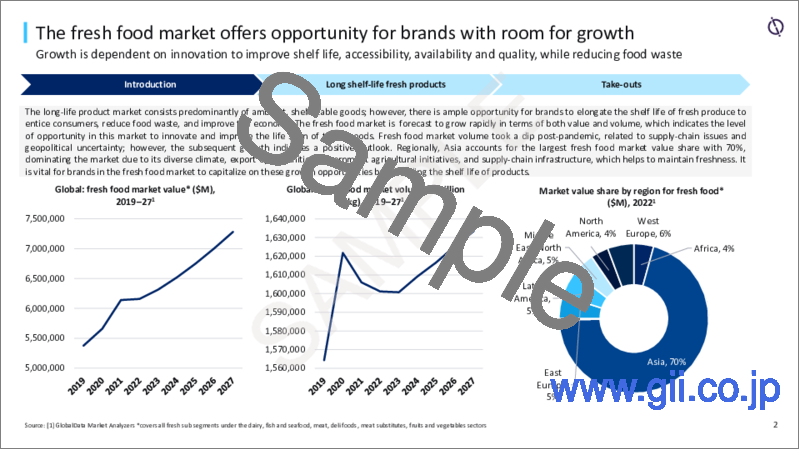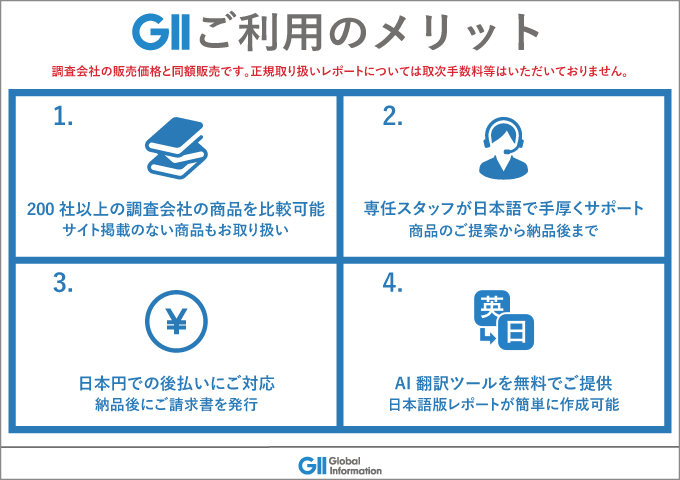|
|
市場調査レポート
商品コード
1388228
賞味期限の長い生鮮食品 - 費用対効果、健康と福祉、持続可能性、サプライチェーンの不確実性Long Shelf-Life Fresh Products - Cost Effectiveness, Health and Wellbeing, Sustainability and Supply Chain Uncertainty |
||||||
|
● お客様のご希望に応じて、既存データの加工や未掲載情報(例:国別セグメント)の追加などの対応が可能です。 詳細はお問い合わせください。 |
|||||||
| 賞味期限の長い生鮮食品 - 費用対効果、健康と福祉、持続可能性、サプライチェーンの不確実性 |
|
出版日: 2023年09月24日
発行: GlobalData
ページ情報: 英文 37 Pages
納期: 即納可能
|
- 全表示
- 概要
- 目次
賞味期限の長い生鮮食品市場は、主に常温保存可能な商品で構成されているが、消費者を魅了し、食品廃棄を削減し、経済を改善するために、ブランドが生鮮食品の賞味期限を延ばす機会は十分にあります。消費者がより健康的な選択をし、新鮮な果物や野菜のような栄養価の高い商品を積極的に摂取しようとしているため、生鮮食品全体に対する需要は高いです。新鮮な野菜や果物の日持ちが悪いという考えは、予算が限られている消費者にとっては問題です。
生鮮品の賞味期限が短いことは、無駄や費用対効果の低い選択につながる可能性があるため、予算に敏感な消費者にとっては懸念事項です。生鮮食品市場は、消費者が消費を避けたり控えめにしたりするリスクを抱えています。消費者が商品の賞味期限を長く評価するのは、それが消費に柔軟性をもたらすからです。
多くの消費者にとって利便性は不可欠であり、缶詰はこの需要を満たしているが、より日持ちのする生鮮食品にとっては機会となります。添加物や保存料の使用は、天然資源を汚染し、食物連鎖を乱す可能性があるため、環境的に有害であると考えられており、ブランドは持続可能な製品保存方法を見つけることが極めて重要になっています。
食品の賞味期限が長いと、消費者は食事計画を立てやすくなり、衝動消費を減らすことができます。しかし、長持ちする商品には、不健康な保存料を避けることが重要です。
消費者は、経済危機やサプライチェーンが不安定な時代に安心感を得るために、保存可能な食品にますます惹かれるようになっているが、このような嗜好は、賞味期限が短い生鮮食品の魅力を制限しています。
当レポートでは、賞味期限の長い生鮮食品市場について調査し、市場の概要とともに、費用対効果、健康と福祉、持続可能性、サプライチェーンの不確実性などをまとめています。
目次
- イントロダクション
- 賞味期限の長い生鮮食品
- 費用対効果
- 便利な柔軟性
- 持続可能な選択
- 健康と福祉
- サプライチェーンの不確実性
- まとめ
- お問い合わせ
Abstract
Industry Insights: Long Shelf-Life Fresh Products asks: can 'long-life fresh' products be successfully offered and help reduce food waste? The report covers cost effectiveness, convenient flexibility, sustainable choices, health and wellbeing and supply chain uncertainty.
The long-life product market consists predominantly of ambient, shelf-stable goods; however, there is ample opportunity for brands to elongate the shelf life of fresh produce to entice consumers, reduce food waste, and improve the economy. The demand for fresh food overall is high due to consumers actively trying to make healthier choices and consume products that provide nutritional benefits, such as fresh fruit and vegetables. The idea of fresh fruit and vegetables not lasting long enough is problematic for consumers who are on tighter budgets, as purchasing these products might seem wasteful and not the most cost-effective option.
Scope
- The short shelf life of fresh goods is a concern for budget-conscious consumers, as it may lead to waste and less cost-effective choices.
- The fresh produce market is at risk of consumers avoiding and moderating consumption. Consumers value longer shelf life in products because it offers flexibility in consumption.
- Convenience is essential to many consumers, and while canned goods fulfil this demand, there's an opportunity for longer-lasting fresh products. Using additives and preservatives is seen as environmentally harmful because they can contaminate natural resources and disrupt the food chain, making it crucial for brands to find sustainable methods of preserving products.
- Longer shelf life for food products benefits consumers by promoting better meal planning and encourages less impulse consumption. However, it is important for long-lasting goods to avoid unhealthy preservatives.
- Consumers are increasingly drawn to shelf-stable food products for reassurance in times of economic crisis and supply-chain uncertainty, but this preference limits the appeal of fresh products, which have shorter shelf lives.
Reasons to Buy
- Understand the growing market for fresh products that have longer shelf lives in order to appeal to budget and sustainability conscious consumers.
- Understand what manufacturers are currently doing in terms of innovation and how consumers are responding.
Table of Contents
Table of Contents
- Introduction
- Long Shelf-Life Fresh Products
- Cost-Effectiveness
- Convenient Flexibility
- Sustainable Choices
- Health and Wellbeing
- Supply-Chain Uncertainty
- Take-outs
- Contact Us




